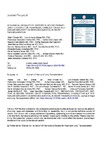Mostrar o rexistro simple do ítem
Mechanical circulatory support in severe primary graft dysfunction: peripheral cannulation but not earlier implantation improves survival in heart transplantation
| dc.contributor.author | Olivella, Aleix | |
| dc.contributor.author | Almenar-Bonet, Luis | |
| dc.contributor.author | González-Vílchez, Francisco | |
| dc.contributor.author | Díez-López, Carles | |
| dc.contributor.author | Díaz-Molina, Beatriz | |
| dc.contributor.author | Blázquez-Bermejo, Zorba | |
| dc.contributor.author | Sobrino-Márquez, José Manuel | |
| dc.contributor.author | Gómez-Bueno, Manuel | |
| dc.contributor.author | Garrido-Bravo, Iris P. | |
| dc.contributor.author | Barge-Caballero, Eduardo | |
| dc.contributor.author | Farrero-Torres, Marta | |
| dc.contributor.author | García-Cosío, María Dolores | |
| dc.contributor.author | Blasco-Peiró, Teresa | |
| dc.contributor.author | Pomares-Varó, Antonia | |
| dc.contributor.author | Muñiz, Javier | |
| dc.contributor.author | González-Costello, José | |
| dc.date.accessioned | 2023-03-21T08:36:12Z | |
| dc.date.issued | 2023-03-15 | |
| dc.identifier.citation | Olivella A, Almenar-Bonet L, González-Vílchez F, Díez-López C, Díaz-Molina B, Blázquez.Bermejo Z, et al. Mechanical circulatory support in severe primary graft dysfunction: peripheral cannulation but not earlier implantation improves survival in heart transplantation. J Heart Lung Transplant. 2023;42(8):1101-1111. | es_ES |
| dc.identifier.issn | 1053-2498 | |
| dc.identifier.uri | http://hdl.handle.net/2183/32724 | |
| dc.description.abstract | [Abstract] Background. Primary graft dysfunction (PGD) still affects 2-28% of heart transplants (HT). Severe PGD requires mechanical circulatory support (MCS) and is the main cause of death early after HT. Earlier initiation has been suggested to improve prognosis but the best cannulation strategy is unknown. Methods. Analysis of all HT in Spain between 2010 and 2020. Early (<3 hours after HT) vs late initiation (≥3 hours after HT) of MCS was compared. Special focus was placed on peripheral vs central cannulation strategy. Results. 2376 HT were analyzed. 242 (10.2%) suffered severe PGD. 171 (70.7%) received early MCS and 71 (29.3%) late MCS. Baseline characteristics were similar. Patients with late MCS had higher inotropic scores and worse renal function at the moment of cannulation. Early MCS had longer cardiopulmonary bypass times and late MCS was associated with more peripheral vascular damage. No significant differences in survival were observed between early and late implant at 3 months (43.82% vs 48.26%; log-rank p=0.59) or at 1 year (39.29% vs 45.24%, log-rank p=0.49). Multivariate analysis did not show significant differences favoring early implant. Survival was higher in peripheral compared to central cannulation at 3 months (52.74% vs. 32.42%, log-rank p 0.001) and one year (48.56% vs. 28.19%, log-rank p 0.0007). In the multivariate analysis, peripheral cannulation remained a protective factor. Conclusions. Earlier MCS initiation for PGD was not superior compared to a more conservative approach with deferred initiation. Peripheral compared to central cannulation showed superior 3-month and 1-year survival rates. | es_ES |
| dc.language.iso | eng | es_ES |
| dc.publisher | Elsevier | es_ES |
| dc.relation.uri | https://doi.org/10.1016/j.healun.2023.03.008 | es_ES |
| dc.subject | Mechanical circulatory support | es_ES |
| dc.subject | Primary graft dysfunction | es_ES |
| dc.subject | Heart transplantation | es_ES |
| dc.subject | VA ECMO | es_ES |
| dc.subject | Peripheral Cannulation | es_ES |
| dc.title | Mechanical circulatory support in severe primary graft dysfunction: peripheral cannulation but not earlier implantation improves survival in heart transplantation | es_ES |
| dc.type | info:eu-repo/semantics/article | es_ES |
| dc.rights.access | info:eu-repo/semantics/embargoedAccess | es_ES |
| dc.date.embargoEndDate | 2024-03-15 | es_ES |
| dc.date.embargoLift | 2024-03-15 | |
| UDC.journalTitle | The Journal of Heart and Lung Transplantation | es_ES |
Ficheiros no ítem
Este ítem aparece na(s) seguinte(s) colección(s)
-
GI- GRINCAR - Artigos [216]






